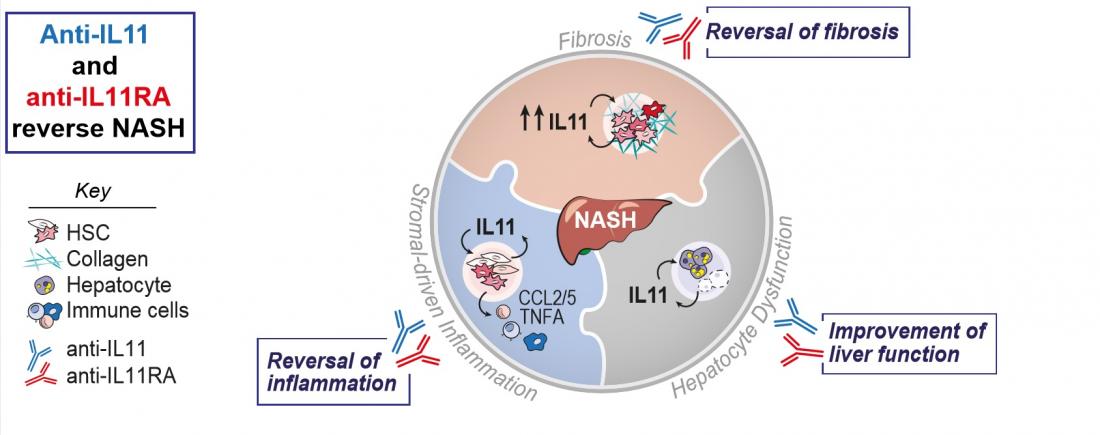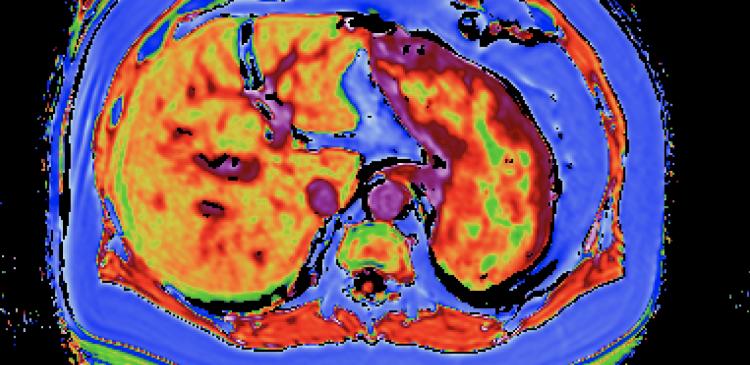IL-11 is central importance to the three major pathologies of NASH i.e. liver damage, liver inflammation, and liver fibrosis (scarring). Blocking IL11 signalling with therapeutic antibodies reverses NASH pathologies and improves liver functions.
SINGAPORE, 22 May 2019 – A team of researchers led by Duke-NUS Medical School and National Heart Centre Singapore (NHCS) found that deactivating a specific protein − interleukin 11 (IL11) – with drugs called therapeutic antibodies, reverses inflammation and scarring of the liver in patients suffering from an untreatable type of fatty liver disease called non-alcoholic steatohepatitis (NASH). The findings[1], published in the top journal for liver and gut diseases, Gastroenterology, have implications for the development of drugs to treat the disease.
Fatty liver disease is very common in Singapore and affects approximately one in four people around the world. People with diabetes and obesity are particularly at risk. Fatty liver disease can progress to cause liver inflammation, fibrosis and NASH, which increases the risk of liver failure. There is currently no treatment for fatty liver disease and NASH, and drugs tested in patients thus far have failed to work.
“We questioned whether the IL11 protein is important for fat accumulation, scarring and inflammation of the liver due to the overconsumption of fatty food and sugary drinks. Our team found that this protein is very important for these processes, and inhibiting it can not only prevent fatty liver disease but also reverse it after it has taken hold of the liver,” said Dr Anissa Widjaja, Senior Research Fellow at Duke-NUS’ Cardiovascular and Metabolic Disorders (CVMD) Programme and first author of this study.
The team found that the IL11 gene triggers the development of NASH and fat accumulates in the livers of people with the condition. It is most common in people who are obese and diabetic, and causes fatigue, abdominal pain, itchy skin, nausea, and can ultimately lead to liver cirrhosis or cancer.
The therapeutic antibodies developed by Duke-NUS and NHCS researchers inhibited IL11 in a pre-clinical model that mimicked the human form of NASH, preventing and reversing liver inflammation, and even leading to lower blood levels of cholesterol and glucose.
“Millions of people are affected by diabetes and dangerous fatty liver disease – we have identified a new approach to treat these patients and restore their liver function, while lowering the dangerous fats and glucose in their blood,” added Professor Stuart Cook, corresponding author of the study, who is the Tanoto Foundation Professor in Cardiovascular Medicine and Director of the CVMD Programme at Duke-NUS, Senior Consultant at NHCS, and Director and Co-Founder of Enleofen Bio, a biotechnology company established in Singapore that is now developing the antibody therapeutics for clinical trials. The company aims to have the drugs ready for clinical trials by the end of 2020.
-------------------------------
About Duke-NUS Medical School
Duke-NUS is a partnership between Duke University School of Medicine and the National University of Singapore (NUS).
In 2005, with support from the Singapore government, NUS and Duke University, two academic institutions with strong track records in research and education, committed to combine the unique medical education curriculum at Duke University School of Medicine with the academic rigour and
rich resources offered by NUS, and to offer students an enriching and innovative medical educational experience.
Duke-NUS is located on the main campus of the largest healthcare group in the country, Singapore Health Services (SingHealth). This group collectively delivers multi-disciplinary care among 42 clinical specialties across a large network of hospitals, national specialty centres and polyclinics.
Together, Duke-NUS and SingHealth constitute a leading, world-class Academic Medical Centre embodying the goal of delivering the highest levels of patient care, education and research. For more information, please visit the website (link below).
About NHCS
The National Heart Centre Singapore (NHCS) is a national and regional referral centre for cardiovascular diseases. NHCS provides a one-stop comprehensive cardiac care ranging from preventive, diagnostic, therapeutic to rehabilitative services. It is also the only heart and lung transplantation centre in Singapore.
Each year, NHCS handles over 120,000 outpatient consultations, 9,000 interventional and surgical procedures and 10,000 inpatients. Its clinical outcomes for heart attack treatment, balloon angioplasty with stenting and coronary bypass surgery have been shown to be equivalent to international benchmarks.
Established in 1998, NHCS is the pioneer in cardiovascular care in Singapore.
For more information, please visit the website (link below).
About Enloefen Bio
Enleofen Bio Pte. Ltd. was founded in 2017 as a spin-out from National Heart Centre Singapore (NHCS), SingHealth and Duke-NUS Medical School with Series A funding. Enleofen develops firstin-class antibody therapeutics for the treatment of fibro-inflammatory human diseases. The initial discovery science and drug target validation was carried out at NHCS and Duke-NUS, funded by Professor Stuart Cook’s STAR award from the National Medical Research Council (NMRC).
Several patent applications and a number of advanced antibody and inhibitor drug candidates arising from the scientific work have been licensed to the company, giving it a significant head start in drug development. Key patents have been granted in Europe, the US, and further countries in the meantime. Enleofen aims to have its lead antibody in clinical trials by the end of 2020 with the goal of developing a drug that can be used to treat multiple fibro-inflammatory diseases for which there are currently no treatment options.
For more information, please visit www.enleofen.com
For media enquiries, please contact:
Lekshmy Sreekumar, Ph.D.
Communications
Duke-NUS Medical School
Tel: +65 65161138
Email: [email protected]
Elaine Loh
Corporate Development
National Heart Centre Singapore
Tel: +65 6704 2387
Email: [email protected]
Glossary for the Medical Terms
Interleukin 11 (Il11) − a critical protein that causes fibrosis and organ damage, which was initially thought to be anti-fibrotic until the same team of researchers overturned this misconception.
Non-alcoholic fatty liver disease (NAFLD) – a common liver disorder and refers to a group of conditions where there is accumulation of excess fat in the liver of people who drink little or no alcohol. It is also commonly known as ‘fatty liver’.
Non-alcoholic steatohepatitis (NASH) – Liver inflammation and damage caused by a buildup of fat in the liver. It is a part of a group condition called non-alcoholic fatty liver disease. When NASH gets worse, it causes scarring of the liver, which leads to cirrhosis.




